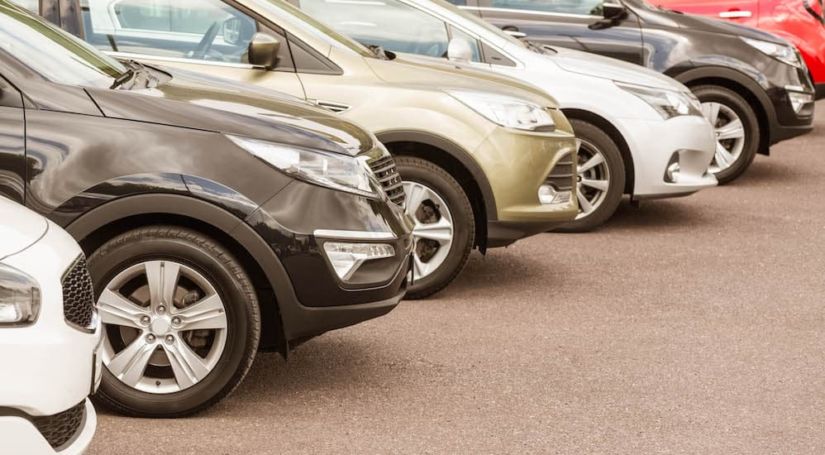Are you preparing for your trip to used car dealers? Well, you better make sure that you’re fully prepared for your upcoming adventure. There are seemingly dozens of details you’ll have to juggle during your pursuit, and this can make an already-stressful ordeal that much more stressful.
Fortunately for you, we’re here to help. Below, we’ve explored a handful of questions you should be asking yourself before and while you’re shopping around for used cars. Ultimately, these questions won’t only help you secure the best possible deal; rather, they’ll also help improve the entire buying experience.
Question #1: What’s Your Budget?
If you’ve decided to opt for a used car, there’s a good chance that you’re operating on some kind of budget. However, when you actually start diving into the actual car-buying process, you may feel enticed to expand that budget a little bit in pursuit of the perfect ride.
In simplest terms, THIS IS NOT A GOOD IDEA.
Exceeding your budget is a good way to get yourself in a financial mess. If you can’t afford your impending monthly payments (assuming you opted for some type of financing), then you could find your credit score plummet. If you stretch yourself too thin, and if you find yourself needing some inevitable repairs, you may find that you’re without a car altogether.
If you’re really focused on a specific model, model year, or car amenity, then you should instead be looking for the best possible bargain. You ultimately have all the leverage during negotiations, as you’re not required to opt for any deal.
Before you start shopping for a target ride, making sure you get a full understanding of the proper value of that used ride. Refer to resources like Kelley Blue Book to gauge the appropriate asking price, and then refer to that value as you’re negotiating with a dealership or seller.
Many experts suggest establishing a specific price range, but you should also be identifying an ideal price tag. When negotiating with the seller, you can refer to your range, but you should keep that specific price tag private. If you reveal what you’re looking to spend, you could find yourself missing out on an even better deal. It’s most important to be honest with yourself as you’re establishing this price range, but it’s okay if you’re not being completely transparent to the seller.
Finally, it’s important to reiterate that you’re in the proverbial driver’s seat. In other words, you shouldn’t be afraid to walk away from negotiations. If the vehicle is out of your price range, you really shouldn’t be taking the risk of opting for the vehicle. Instead, take a deep breath, thank the salesman for their time, and search for a used car elsewhere.

Question #2: Is the Vehicle Reliable?
This is a question that’s constantly flowing through customers’ minds, especially when they’re opting for a car from a used car dealer. Nowadays, these pre-owned vehicles are pretty reliable, so you shouldn’t worry about coming across a lemon (especially if you’re purchasing the vehicle from a reputable dealership). Either way, it’s still important that you understand what you’re getting yourself into before officially opting for a used ride.
If you end up zeroing in on a specific vehicle, you can refer to the ride’s Carfax vehicle history report. This will alert you of any major accidents or incidents, and some of these inclusions could be enough to dissuade you from making a purchase. This will be especially important if you’re purchasing the used vehicle from a private seller or an unreputable dealership… There’s ultimately no limit to what kind of indiscretions a seller will try to hide.
Furthermore, you should absolutely give a targeted used car a test drive before committing to a purchase. For starters, a test drive will identify any odd sounds or any handling issues, which could all be an indication of a more worrisome issue. At the very least, these odd noises could help you knock some money off the asking price.
A test drive will also allow the customer to gauge whether the vehicle is a proper fit. If the acceleration isn’t to your liking or if the interior is a bit too cramped, you can quickly realize that you should be switching your focus to another vehicle. This often gets overlooked by potential car buyers; your comfort should also be a priority, and a test drive will at least give you a clue if your targeted ride will accommodate your needs.
If you’re really feeling cautious, you can take the targeted used vehicle to a trusted private mechanic. While you’re presumably capable of identifying any issues with the exterior, interior, or basic mechanical components, a professional mechanic can dig in and identify any issues that may be lingering under the surface. Chances are, everything is fine… But it never hurts to be overly careful.
Remember: all of these tips are meant to absolutely assure that you’re opting for the proper choice. You shouldn’t be paranoid about opting for a lemon, but it’s in your best interest to be as cautious as possible.
Question #3: What Amenities Do You Want?
One underrated aspect of opting for a used car if the opportunity to get normally pricey amenities thrown into the asking price of the vehicle.
For example, a leather interior would probably be too expensive to opt for if you were purchasing a new car. However, by opting for a used vehicle, you may have more financial wiggle room to opt for a used car that’s adorned in leather. There’s a good chance that the seller has already accounted for this luxury feature in their asking price; at the very least, the seller or dealership won’t require extra fees if these specific features are included in the ride.
Ultimately, you could limit your used-car search to vehicles that include specific amenities like sunroofs or infotainment systems. Assuming the vehicle fits within your budget, you could then throw these vehicles to the top of your target list. There’s really no limit to what kind of features you could have fall into your lap, so it’s best to keep your options open.
Similarly, when shopping around for a used ride, you should also be investigating which amenities aren’t working properly. While the inclusion of a specific feature is all well and good, it doesn’t do the owner much good if the feature isn’t working. If you notice that a specific amenity isn’t operating properly, then you could use that to knock down the asking price of the vehicle (especially if the seller touted the feature in their listing).
Question #4: Where’s the Title?
This isn’t all that relevant of a question if you’re purchasing from a used car dealer. It’s basically guaranteed that the business will have the title handy, and they’ll be willing to hand it off when you make your purchase.
However, if you’re opting for a used car from a private seller, there’s no guarantee that they’ll have the title readily available. This is an important document, as it officially declares you the owner of the ride. Before you even check out the targeted used car, make sure you ask about the current status of the title. In reality, this shouldn’t be a concern… But if the seller doesn’t have the title available, you may have to overcome additional hurdles.



